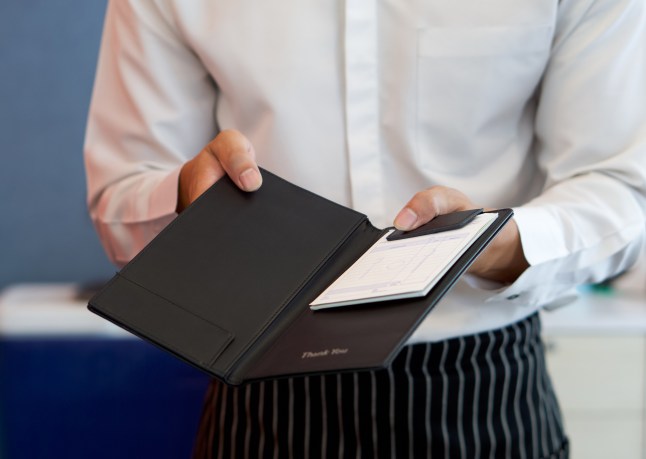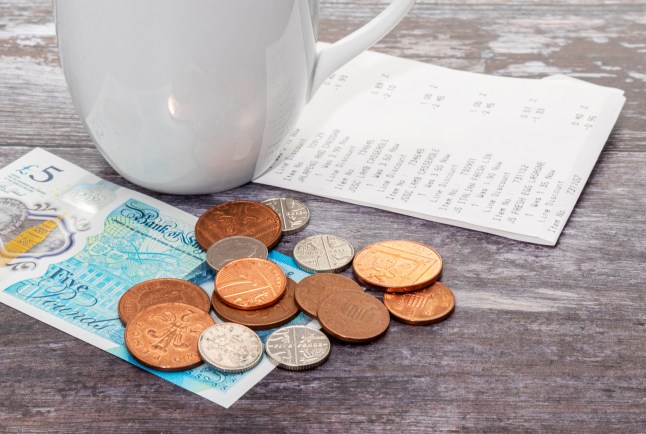Restaurant tipping rules are quietly changing — and service charges could rise to 20%



Name something more British than the awkward moment when one person wants to contest the service charge at dinner and the other just wants to pay the bill and skedaddle
The whole situation becomes ten times more uncomfortable when it happens on a first date…
This point of contention isn’t going to get any easier any time soon, in fact, it might end up causing even more tension. That’s because the UK’s unwritten restaurant rules around service charges and tipping seem to be changing across the nation.
Service charges are being added to bills just about everywhere these days – from your local pub to the tiny cafe on the corner. And honestly, with the struggles the hospitality industry has been facing amid the cost of living crisis, it’s not much of a surprise.
But what might come as a shock to some is that it’s becoming the norm to see service charges of 15% these days on bills, instead of the 10 or 12.5% we’d all become accustomed to.

How are service charges changing in the UK?
Experts have claimed that 15% is going to become the new industry standard when it comes to restaurant service charges, while some suggest we could see this moving more in-line with the 20 to 25% tipping rate that’s standard across America in the future.
A number of popular restaurants have already started adding a 15% charge to bills so it’s not difficult to see how this could quickly increase.
In London, European restaurant The Wolseley has a discretionary 15% service charge as well as a mandatory £2.50 cover charge.
Similarly, Fallow in St James’s Market, a popular brunch spot, adds a 15% service charge to bills and a £1 charge to be donated to support the UN Women UK.
The story is also the same at Gordon Ramsay’s Lucky Cat restaurants in Mayfair and Bishopsgate, plus Bob Bob Ricard and Bebe Bob in Soho.
Latest London news

Some believe the fees have been driven up by new government legislation that made it mandatory for all tips to be passed on to workers without any deductions.
Corin Camenisch, marketing and growth Lead at SumUp, tells Metro: ‘The current economic climate presents challenges for consumers, hospitality workers and employers. Part of the reason for the rise in service charges is the Allocation of Tips Act, which dictated that all tips and service charges must be given to hospitality staff. The act aimed to to create a fairer playing field for those in the service industry, meaning employees get a fair slice of their well earned gratuity, while also giving consumers peace of mind that when they tip, their money is going to the right place.
‘Cash tips are already protected by law, but the new legislation goes further to cover tips added to a card payment which are more and more becoming the norm. Many hospitality workers are on the national or living wage and rely on tips, so making sure they get their fair share of the pie is the right thing to do both for businesses and the wider economy.’
What is a service charge?
When it comes to the purpose of these charges, Kate Nicholls, chief executive of UK Hospitality, previously told Metro: ‘Service charge policies are set and determined by individual businesses, so it is up to them to determine the level of charge.
‘Service charges serve a variety of functions, but primarily reward staff and provide a boost to employees’ earnings, ensuring that venues can continue to provide the highest standard of service possible.’
And while these charges might be a positive for hospitality employees, not all diners are happy about the changes.
Metro journalist Gergana Krasteva branded London’s tipping culture ‘out of control’ after being charged a 12.5% service fee for just one glass of wine at a bar in High Street Kensington.
She said: ‘I’m happy to tip if I sit down and have dinner at a restaurant, but not if the wine is poured in front of me at the actual bar and then I carry it to my table. Plus, they didn’t give me an option. It was only after that I realised, which is the more annoying part. In general, I think tipping is out of control in London.’
And Tom Bourlet had strong feelings about the idea of 25% charges like in the US.
He told us: ‘I’ve not seen any charge higher than 10% but it would be a shock to suddenly see 25% put on. Without wanting to sound harsh, I wouldn’t exactly be happy, that’s a huge amount to add. 10% being added to each drink in bars is bad.’

And it’s clear from new research by SumUp, that people in the UK aren’t keen to leave bigger tips.
Despite the number of businesses that have been applying suggested tips to digital payments increasing by 78% between 2022 and 2024, Brits haven’t got on board with digital prompts to pay more. Instead, we’ve been sticking firmly at the familiar 10% rate.
The average tip given by customers over the last three years remained between 10.2% and 10.6% according to the data.
Corin comments: ‘Unlike the US, where tipping is ingrained as the norm, British customers have historically been more reserved about tipping. Even as digital tipping simplifies the process, it seems this cultural reticence persists.
‘To British punters’ credit, they will go out and support venues and they’ll tip the same 10% regardless of how bad the economy and inflation may hit them.’
Do you have to pay a service charge?
Don’t worry – if you’re not happy with the idea of paying an extra 15% or 20% on top of your bill, we checked with an expert and, yes, you can ask for it to be removed without sounding like a dreadful person.
Etiquette coach John-Paul Stuthridge told Metro: ‘The hospitality industry is often too turbulent at the best of times. It rarely has healthy cash flow or reserves other industries can depend on, not least the high turnover of staff and cost of recruitment. Throw in an extensive lockdown and a world cost of living crisis, restaurants have added service charges to help recoup their losses. Increasing the charge further helps them combat the crisis that is hard for some to say no to.
‘You can much more easily not go to a restaurant that’s upped its prices by 15%, but how many people will just accept a 15% service charge and politely say nothing? Many.’
He continues: ‘Whether you should ask to remove it may depend on how charitable you feel, or if the service genuinely deserved it. It is your call.’
If you truly don’t feel like the service is worthy of the charge on the bill, don’t get mean about it, just be, as John-Paul recommends, ‘direct and honest’.
‘No reason needs to be given, however, if you are asked, then give your polite feedback in an honest, but short to-the-point manner,’ he adds.
‘The higher the figure for service charge, the less likely customers will oblige, but having it removed altogether, so guests can tip the individual server the amount they want to give remains a legitimate and more proper compromise.’
More money news from Metro:
Do you have a story to share?
Get in touch by emailing MetroLifestyleTeam@Metro.co.uk.